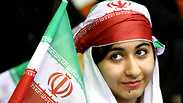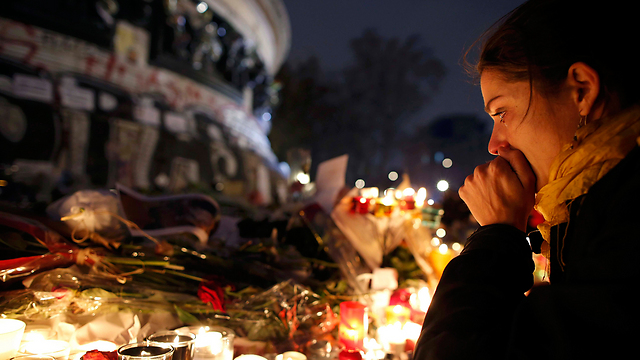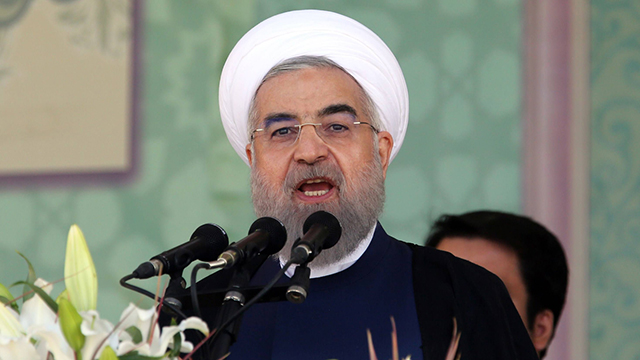
From Tehran with love: Iran's reaction to the Paris attacks
Op-ed: The Islamic republic's messages of support to France are hypocritical: Iran is a state sponsor of terrorism and has its own reasons for wanting to see Islamic State toppled.
One of the first leaders to express their condolences following the Paris attacks was Iran’s president Hassan Rouhani. In his message to French president François Hollande he condemned the attacks, while reminding Hollande that Iran itself has been a victim of “the scourge of terrorism.”
Foreign Minister Mohammad Javad Zarif explained that Rouhani’s planned trip to Europe would be postponed – now was the time to fight terror, and the visit could wait. An Iranian Foreign Ministry spokesperson added that the terrorist groups that committed the crime have no ethical principles, and are “not loyal to any type of divine religions – including Islam.”
The expressions of solidarity coming from Iran’s president to the victims of terror in Paris, and the collective hug to France in its difficult hour following the cruel and “unethical” terror, should not fool us. The stronger the perception of Islamic State as the ultimate evil, the more Iran has to gain from the situation.
The hypocrisy of the Iranian message rings loud and clear, although Iran is not alone in this regard: messages have been pouring in from other states, including Saudi Arabia and Russia. But in the case of Iran we are talking about a state sponsor of terrorism that has encouraged radical ideologies in the Middle East.
Iran is deeply involved in the immense bloodshed in Iraq and Syria, and executes its own citizens in ever-increasing numbers. The similarities between Iran and Islamic State find expression in a cartoon by Kaniwar (an independent Kurdish-Syrian cartoonist), who presented the flags of Iran and Islamic State side by side as curtains – beneath the Islamic State curtain one could see severed heads, while beneath the Iranian curtain, feet dangling in midair.
But beyond the hypocrisy, Iran is trying to gain from the situation in strategic and geopolitical terms. From the time that Islamic State rose to international awareness in the summer of 2014, Iran realized that it could leverage the horror to its advantage. The West is shocked by video-clips of the beheadings of journalists? So let’s discuss.
Iran, who was at that time negotiating with the P5+1 parties over the nuclear file, hinted to them that there may be an opportunity for a side understanding. The suggestion was that if the international actors were to lower their demands of Iran in the nuclear realm, there may be a possibility that Iran could cooperate with the US in its fight against Islamic State.

For this reason, it was hinted, the parties should strive to close the nuclear file as soon as possible; in other words, the P5+1 should back down from their exaggerated and unwarranted demands from Iran with regard to dismantling its nuclear infrastructure.
So what if Iran clearly had its own strong interest in fighting Islamic State, a Sunni organization that had begun to take control of territory in neighboring Iraq? If Islamic State was now perceived as the monster in the West, then Iran – who immediately went down a rung on the "threat ladder" – had something to gain. The US was non-committal – the administration stated that it would certainly not cooperate with Iran in the fight against Islamic State, but hinted that there might be need for some coordination between the countries.
In parallel, there were those who began to detect initial indications of a potential shift in the US's approach to the Middle East. The Obama administration seemed to be considering Iran - involved in so many conflicts in the region and yet secure within its borders - as a potential solver of the Middle East's problems rather than their root cause.
It’s not clear whether such a change in US policy occurred. What is clear is that Iran is today in the post-nuclear deal period, on the basis of an arrangement that sadly did not resolve the nuclear challenge. Iran has significantly increased its presence on the ground in Syria with Revolutionary Guard forces, and recently tested a new long-range precision-guided ballistic missile, capable of carrying a nuclear payload.
Yet Iran is now invited to take part in talks in Vienna to find a solution to the situation in Syria – which means that Iran’s role in Syria is recognized by international powers, and its concerns will be taken into account.
So why shouldn’t Iran throw a kind word to France in this most difficult hour? Iran is also worried about that monster Islamic State, that has no ethical principles or religious values.
Emily B. Landau is Head of the Arms Control and Regional Security Program at the Institute for National Security Studies.











